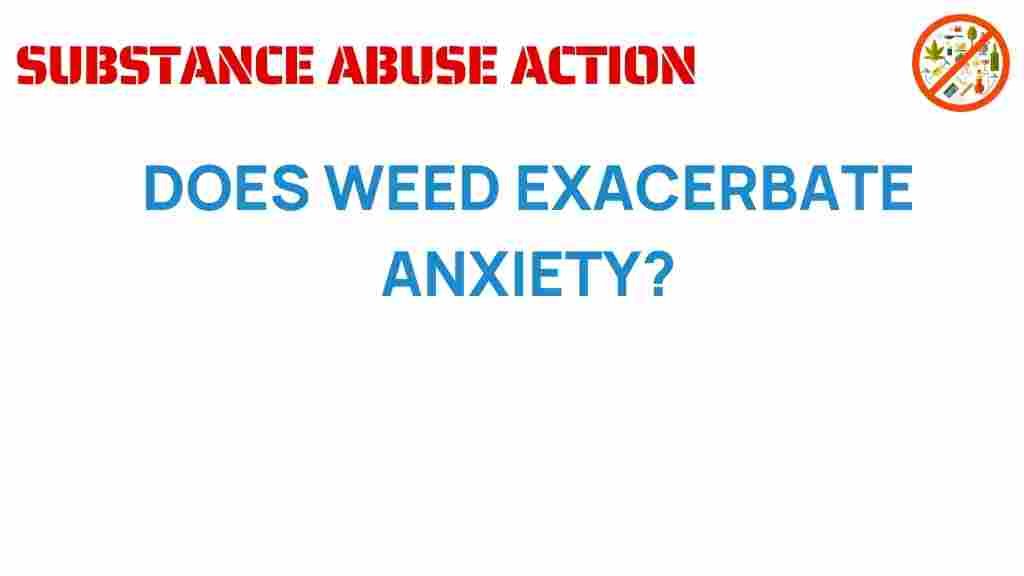The Surprising Link Between Weed and Anxiety: What You Need to Know
The relationship between weed and anxiety is complex and often misunderstood. For some, cannabis can provide relief from stress and anxiety, while for others, it can exacerbate these feelings. Understanding the psychological impact of cannabis is crucial for anyone considering its use for mental health purposes. This article explores the latest research findings, addresses common marijuana misconceptions, and examines the addiction potential of cannabis when used for anxiety relief.
The Dual Nature of Cannabis Effects
Cannabis contains various compounds known as cannabinoids, with tetrahydrocannabinol (THC) and cannabidiol (CBD) being the most prominent. Each of these compounds can have different effects on the mind and body. Understanding these effects is essential for anyone looking to use weed for anxiety relief.
- THC: Known for its psychoactive properties, THC can induce feelings of euphoria but may also lead to increased anxiety in some users.
- CBD: Unlike THC, CBD does not produce a high. Research suggests that CBD may help reduce anxiety and promote a sense of calm.
The balance between THC and CBD can significantly influence the overall experience of the user. Finding the right strain or product is crucial for managing anxiety effectively.
Research Findings on Weed and Anxiety
Numerous studies have been conducted to explore the relationship between weed and anxiety. Here are some key findings:
- A 2019 study published in the Journal of Affective Disorders found that CBD could significantly reduce anxiety in participants.
- Conversely, a 2020 study indicated that high doses of THC could increase anxiety levels in users, particularly in those predisposed to anxiety disorders.
- Research from the American Journal of Psychiatry suggests that individuals with anxiety disorders may use cannabis as a form of self-medication, but this can lead to dependency.
These findings highlight the importance of approaching cannabis use with caution, especially for those with existing anxiety issues.
Marijuana Misconceptions and Reality
There are many misconceptions surrounding the use of marijuana for anxiety relief. Let’s clarify some of these myths:
- Myth 1: All cannabis helps with anxiety.
Reality: Different strains and cannabinoid profiles can have varying effects on anxiety. - Myth 2: Cannabis is a safe alternative to prescription medications.
Reality: While some may find relief, cannabis can also lead to increased anxiety or dependency. - Myth 3: CBD products are completely risk-free.
Reality: CBD can interact with other medications and may cause side effects.
Understanding these misconceptions can help users make informed decisions about their mental health treatment options.
The Psychological Impact of Cannabis on Anxiety
The psychological impact of using weed for anxiety varies widely among individuals. Factors such as dosage, strain, and personal history all play a role in how cannabis is perceived and its effects on mental health.
- Short-term effects: Many users report immediate relief from anxiety symptoms, including reduced tension and improved mood.
- Long-term effects: Regular use can lead to increased tolerance, dependency, and potential worsening of anxiety over time.
Understanding these dynamics is essential for anyone using cannabis as a coping mechanism for anxiety.
Step-by-Step Process: Using Cannabis for Anxiety Relief
If you are considering using cannabis for anxiety relief, follow this step-by-step guide to ensure a safe and effective experience:
1. Consult with a Healthcare Professional
Before starting any cannabis regimen, it’s crucial to speak with a healthcare professional, especially if you have a pre-existing mental health condition.
2. Understand the Different Strains
Research various strains and their cannabinoid profiles. Indica strains are often recommended for relaxation, while sativa strains may be better for daytime use but could heighten anxiety in some users.
3. Start with Low Doses
Begin with a low dose of THC and gradually increase it. Monitor your body’s response to determine the right dosage for your needs.
4. Choose the Right Consumption Method
Consider various consumption methods such as:
- Smoking or vaping: Provides immediate effects but can irritate the lungs.
- Edibles: Offer longer-lasting effects but can take time to kick in.
- Tinctures: Allow for precise dosing and faster onset compared to edibles.
5. Monitor Your Symptoms
Keep a journal to track your anxiety levels and any side effects experienced. This will help you adjust your usage as needed.
6. Know When to Seek Help
If you find that your anxiety worsens or you experience negative effects, it’s essential to reassess your cannabis use and consult with a healthcare provider.
Troubleshooting Tips for Anxiety Management with Cannabis
Here are some troubleshooting tips if you encounter issues while using cannabis for anxiety:
- Feeling anxious after using cannabis: Try using strains higher in CBD and lower in THC, as these may be less likely to induce anxiety.
- Difficulty finding the right dosage: Start low and go slow. Adjust your dosage gradually based on your comfort level.
- Experiencing dependency symptoms: If you feel reliant on cannabis, consider taking a break and exploring other anxiety management techniques.
Conclusion
The link between weed and anxiety is intricate and varies from person to person. While some individuals may find cannabis to be an effective tool for managing their mental health, others may experience heightened anxiety or other adverse effects. It’s essential to stay informed about the latest research findings, understand the potential risks and benefits, and approach cannabis use with caution.
Ultimately, consulting with healthcare professionals and being mindful of your own body’s responses are critical steps in using cannabis responsibly for stress relief. By educating yourself on the psychological impact of cannabis, you can make informed decisions that support your overall well-being.
For more information on managing anxiety, consider exploring resources from the National Institute of Mental Health.
Remember, your mental health is important, and finding the right tools for managing anxiety is a personal journey that requires careful consideration.
This article is in the category Health and created by SubstanceAbuseAction Team
